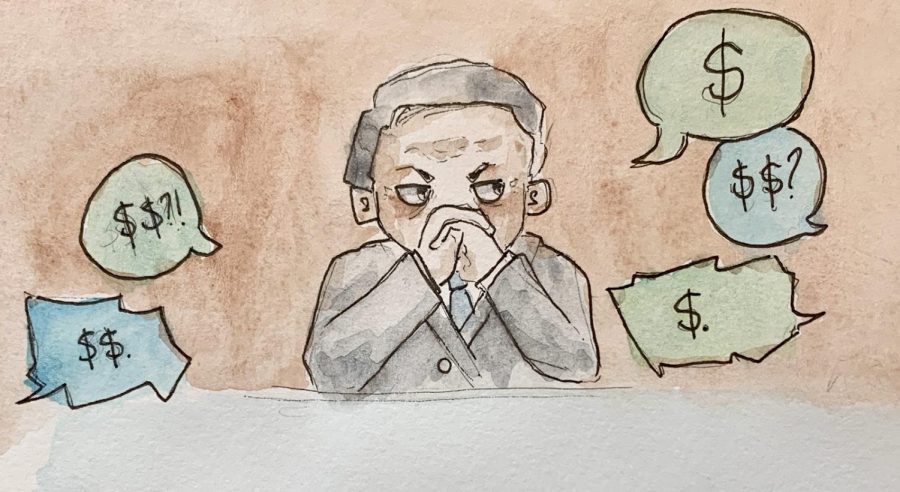Mr Bolsonaro’s Budget for 2021: A Signal of Change?
On August 31, 2020, Brazil’s Executive branch released its plan for the 2021 Federal Budget. With the pandemic raging on for almost six months, Bolsonaro was under a lot of pressure to deliver a well balanced and appropriate statement, especially after his woeful handling of the virus, and his active denouncement against quarantining and taking other important safety measures, such as wearing masks. Did our President rise to the occasion? Let’s delve in and dissect the Executive’s budget choices for the six most important ministries: education, healthcare, economy, defense, science and technology, and environment.
Here is the rundown of each division’s predicted budget, alongside its percentage change when compared to last year, according to Globo:
Education: R$19,955 Billion (8.61% decrease)
Healthcare: R$16,348 Billion (12.13% decrease)
Economy: R$12,983 Billion (19% increase)
Military: R$11,738 Billion (16.16% increase)
Science and Technology: R$2,735 Billion (27.7% decrease)
Environment: R$534 Million (4.8% decrease)
At a glance, it is possible to see that, once again, economic activity, such as imports, exports, and trade, has been prioritized over other needs. With schools shut down for almost six months, and very few states going back to on-campus learning, taking funds away from the education ministry is agonizing, especially when 19.5 million students have no access to distance learning. The pandemic has only served to highlight the astonishing social inequality in our country’s educational system, with the divide between public and private learning becoming an ever-larger abyss. The Executive’s response to this? Suck more funds out of public education, widening the gap between the rich and poor not only in schools but in universities as well. College funds have, throughout this administration, been most siphoned from humanities-only universities, exposing the government’s favoritism towards the natural sciences simply because they are perceived to have a more immediate return to the economy– which, as we have seen and will continue to see, is the basis around many, if not all, of the policies being implemented. Even more outraging though, is the decision to cut about 12% of the nation’s healthcare funds– note that the decrease is in comparison to the original projected budget for 2020, not the one modified because of the Coronavirus pandemic. Taking away funds from the healthcare system after a pandemic is ridiculous in and of itself, but is even more so in a nation where one disease has taken more than 130,000 lives. The pandemic emphasized that a lack of funding is what renders the Sistema Universal de Saúde (SUS) inefficient, rather than an inherent flaw, since it is one of the most inclusive healthcare systems globally. Two other key ministries that have had their budgets slashed are the Environment ministry, and the Science and Technology ministry, responsible for much of Brazil’s research. With the Pantanal and Amazon up in flames, there is no logical reason for the decrease in this fund, not even economic, especially now that many EU nations have threatened to impose sanctions as a result of the fires, which would be a crushing blow to our nation’s economy. Another issue the pandemic has made explicit is the importance of scientific research and constant technological advancement. Once again, here we see two irresponsible, and quite frankly irrational, decisions. However, with the smaller funds devoted to both Education (university research centers) and Science and Technology (labs, research grants, etc) Brazil is bound to be left behind in these spheres, and hence to become reliant on other nations for medicine and technology. Therefore, we can see how the decisions made by the President and his cabinet are, to say the least, inadequate.
Now on to the increasing budgets. The ministry of the economy has given itself a 19% increase in its funds when compared to last year, and given its responsibility to not only help uplift the economy after the pandemic’s effects but to act as a bulwark against a national recession, is a more sensible decision. However once again, this demonstrates the government’s priority of economic return, as this is a ministry that can provide a quick and substantial yield unlike that of the Environment and Research– at least not in the short term. Contrastingly, the military’s projected budget is the most controversial of all. During the beginning of the planning period, Bolsonaro wanted to increase the defense budget, making it larger than that of education and healthcare, which led to a wave of criticism and forced him to take a step back. However, the proposed budget still aims for a 16% increase in our military, which seems to me an awful decision. As mentioned previously, Brazil’s economy has taken a huge hit as a result of the pandemic, and therefore cutting costs should be of the utmost importance. Despite this, Bolsonaro has taken steps to increase spending on a military that hasn’t seen combat since World War II and is already, by and large, the most powerful on the continent. Indeed Brazil has a huge length of borders and coastline that must be protected. However, we are a nation with no military rivals and have had no problem patrolling these areas with our previous military budget, therefore, this spending– especially during a time of economic crisis– is borderline delusional.
On the other hand, Brazil’s military does have a very important social effect, one that has nothing to do with its military prowess. As a nation with a very weak education system, many young, poor, men and women turn to the army for a steady paycheck and a dignified position within society. The armed forces provide millions of young Brazilians with these benefits and some semblance of success. For example, almost all of Brazil’s Olympic medal winners are military personnel. It is this logic that the armed forces use to justify their investments. Investing in the military, they say, is equivalent to developing the nation’s industrial base, creating jobs, exports, and advancing technology. This is a completely valid and very truthful argument, but right now is not the time to increase any budget as significantly as 16%, especially not that of a ministry that did not take a toll nearly as heavy as the others because of the pandemic. It also shouldn’t be Brazil’s plan to develop a nation with its foundation in the military, but rather, through education. A powerful educational system would make schools the salvation for millions of poor Brazilians and would allow for the nation to benefit a lot more from its almost inextinguishable amounts of manpower, land, and natural resources than the military. Moreover, for an administration hellbent on prioritizing the economy, this doesn’t make any sense either since education produces more long-term, sustainable profits than the military. With a fully and strongly educated nation, there is no doubt Brazil would become a political and economic behemoth and would be one of the world’s leaders in every aspect of society.
The federal budget still has to go through Congress, but with President Bolsonaro’s growing alliance to the centrão, a group of political parties that do not have a specific ideological orientation and have the goal of securing proximity to the Executive as a means for more prestigious positions, there is a true possibility that this unbalanced and inappropriate budget– that has the potential to cause many long-term issues for the Brazilian people– will be approved, or at the very most, suffer minor alterations. A budget that will revitalize the economy, but not necessarily the people, does not signal a change, at least not for the better, but rather stagnation and incompetence.













Mark Hillman • Oct 3, 2020 at 4:48 pm
Felipe,
I wonder if you have learned anything about the rationale for cutting public education funding? Does it fit with a political philosophy or is it connected to other strategic political goals of the president?
Curious,
Mr. Hillman
Marcello Bulgarelli • Oct 2, 2020 at 7:22 pm
PERFECT! Great analysis of our political and economical situation!